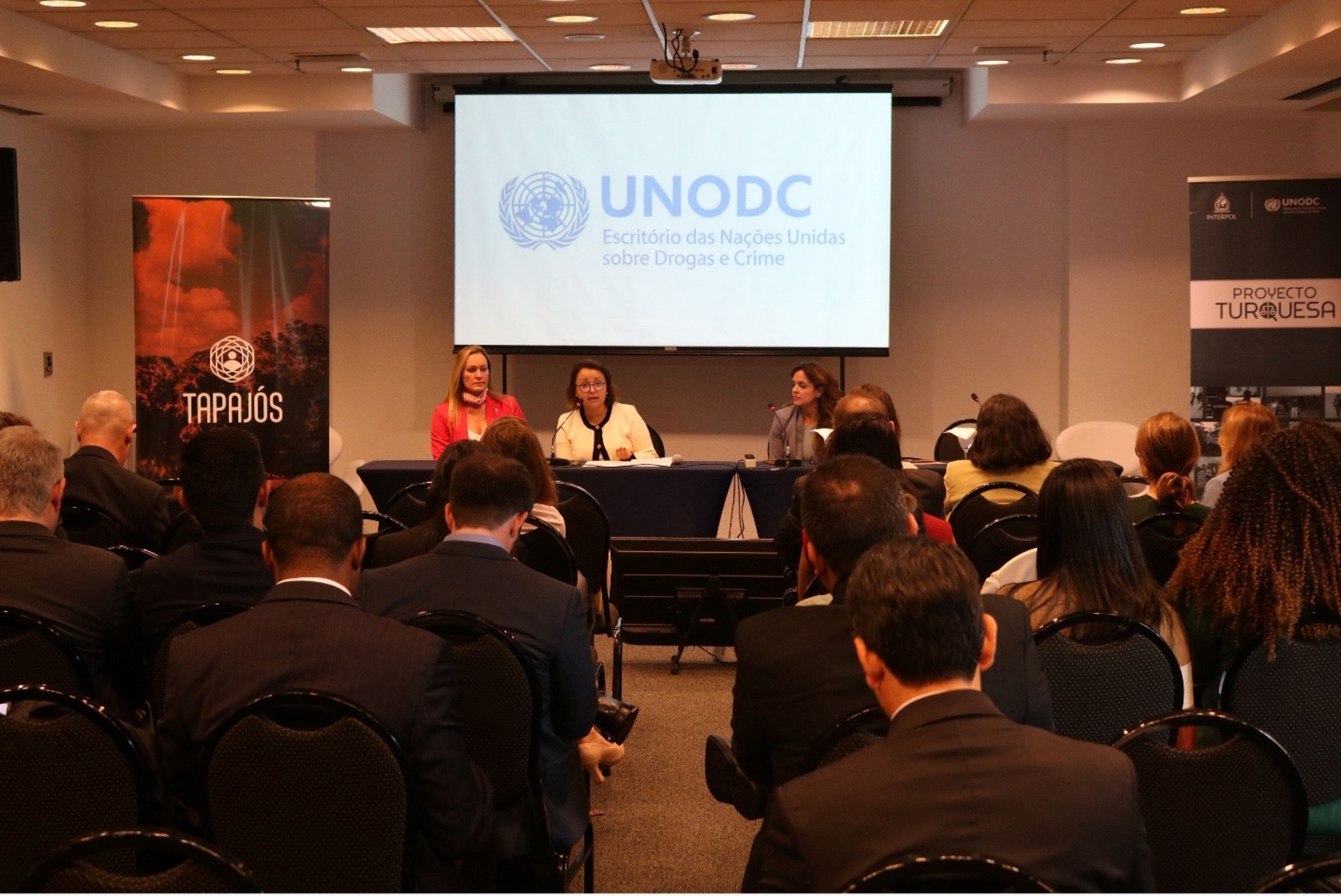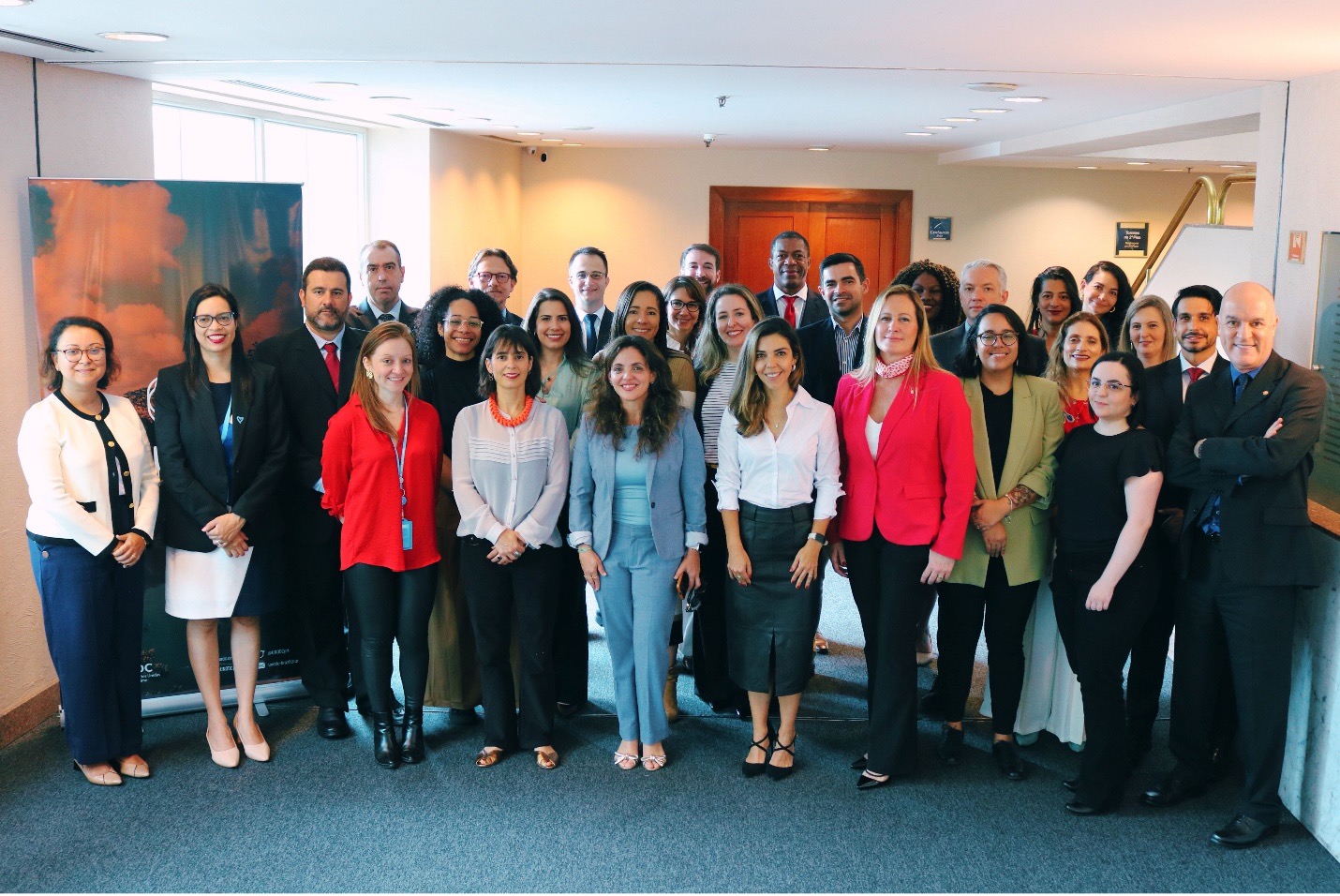São Paulo (SP), 8 November 2024 - Furthering its partnership with the Federal Public Prosecutor's Office (MPF), the United Nations Office on Drugs and Crime (UNODC) held a mentoring session in São Paulo (SP) between 6 and 8 November, specializing in trafficking in persons and migrant smuggling for public prosecutors.

Organized by UNODC, through the Tapajós Project, and the MPF, the training brought together around 25 representatives of the institution, including prosecutors and legal assistants from the recently launched Specialized Offices on International Trafficking in Persons and Migrant Smuggling. The mentoring programme - which also had the support and participation of the Turquoise Project, UNODC's regional initiative in Latin America - included lectures by experts on the subject and group activities with case studies and mock interviews with victims of human trafficking.
During the three-day programme, within the framework of UNODC's mandate as depositary of the Palermo Protocol to Prevent, Suppress and Punish Trafficking in Persons, Especially Women and Children, the debates covered topics such as international cooperation in trafficking in persons and migrant smuggling; cross-cutting topics such as cybercrime and new technologies; financial analysis in investigations; and gender strategies in the fight against trafficking in persons and migrant smuggling.
At the opening of the event, Federal Prosecutor and Deputy Secretary of the Secretariat for International Cooperation (SCI) Stella Fátima Scampini stressed the partnership between the MPF and UNODC on this issue and highlighted the importance of mentoring in the context of the recent creation by the MPF of offices specializing in international human trafficking. The mentoring is part of this context, with the aim of strengthening the institution's capacities through training, technical assistance and the promotion of international legal cooperation.
Among the mentoring panelists were representatives and experts from the MPF, the Federal Police (PF), the Ministry of Justice and Public Security (MJSP), the Labour Prosecutor's Office (MPT), the São Paulo State Prosecutor's Office (MP-SP), the company Meta, the Brazilian Association for the Defence of Women, Children and Youth (Asbrad) and the NGO Circles of Hospitality.

On the UNODC side, there were activities led by trafficking in persons experts from the UNODC Trafficking in Persons and Migrant Smuggling Section (HTMSS) in Vienna, UNODC Colombia and UNODC El Salvador, as well as a presentation of the main trends, victim profiles and vulnerabilities related to the crime of human trafficking in Brazil - based on the findings of the study National Report on Trafficking in Persons: Data 2021 to 2023, produced by UNODC and recently published in partnership with the MJSP.
Specialized trafficking in persons offices - In July 2024, the MPF announced the creation of four specialized units to identify, prevent and repress international human trafficking and migrant smuggling. The initiative was born directly out of a partnership between the MPF and UNODC - which, in 2022, developed a comparative study on specialized units in Latin America to serve as a model for Brazil.
The federal prosecutors assigned to the new specialized units will be responsible for conducting investigations and proposing criminal actions related to cases in different brazilian regions. The idea is that the specialized human trafficking units will enable the formation of joint investigation teams with other countries, strengthening international and regional cooperation to combat trafficking in its many forms and dismantle transnational criminal organizations.
‘The units will be extremely useful in providing agility in a context in which new technologies have expanded the capabilities of criminals to recruit victims across borders,’ said Deputy Attorney General Hindenburg Chateaubriand, at the launch of the specialized offices.
Tapajós Project – TAPAJÓS is a project implemented since 2021 by UNODC Brazil, as part of its mandate to assist countries in implementing the UN Trafficking in Persons Protocol, with funding from the US State Department's Office to Monitor and Combat Trafficking in Persons (J-TIP).
The first phase of the project (2021-2023) aimed to calculate the prevalence of trafficking in persons and slave labour in gold mines in the Tapajós river basin, in the state of Pará. Based on this evidence, the second phase (2023-26) of the project plans to implement a series of activities and interventions - co-produced with local partners - to prevent and reduce these crimes
The first phase of the project (2021-2023) aimed to calculate the prevalence of human trafficking and slave labour in gold mines in the Tapajós river basin in the state of Pará. Based on this evidence, the second phase (2023-26) of the project plans to implement a series of activities and interventions - co-produced with local partners - to prevent and reduce these crimes.
Turquesa Project – Project Turquesa is a joint initiative implemented by UNODC and INTERPOL, with funding from Global Affairs Canada. Its main objective is to combat transnational organized criminal groups that commit human trafficking and migrant smuggling by promoting international legal cooperation mechanisms, as well as strengthening the knowledge and capacities of the authorities - prosecutors and law enforcement officers - who lead investigations and prosecutions throughout Latin America.